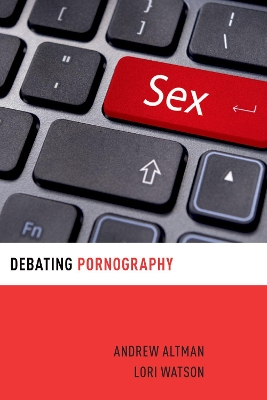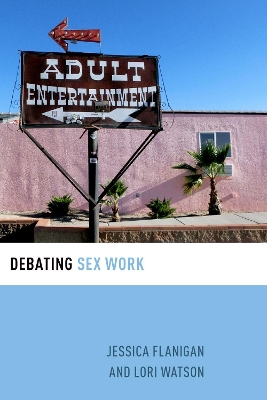Debating Ethics
2 total works
Since the sexual revolution of the 1960s, debates over pornography have raged, and the explosive spread in recent years of sexually explicit images across the Internet has only added more urgency to these disagreements. Politicians, judges, clergy, citizen activists, and academics have weighed in on the issues for decades, complicating notions about what precisely is at stake, and who stands to benefit or be harmed by pornography.
This volume takes an unusual but radical approach by analyzing pornography philosophically. Philosophers Andrew Altman and Lori Watson recalibrate debates by viewing pornography from distinctly ethical platforms - namely, does a person's right to produce and consume pornography supersede a person's right to protect herself from something often violent and deeply misogynistic?
In a for-and-against format, Altman first argues that there is an individual right to create and view pornographic images, rooted in a basic right to sexual autonomy. Watson counteracts Altman's position by arguing that pornography inherently undermines women's equal status. Central to their disagreement is the question of whether pornography truly harms women enough to justify laws aimed at restricting the production and circulation of such material. Through this debate, the authors address
key questions that have dogged both those who support and oppose pornography: What is pornography? What is the difference between the material widely perceived as objectionable and material that is merely erotic or suggestive? Do people have a right to sexual arousal? Does pornography, or some types of
it, cause violence against women? How should rights be weighed against consequentialist considerations in deciding what laws and policies ought to be adopted?
Bolstered by insights from philosophy and law, the two authors engage in a reasoned examination of questions that cannot be ignored by anyone who takes seriously the values of freedom and equality.
This volume takes an unusual but radical approach by analyzing pornography philosophically. Philosophers Andrew Altman and Lori Watson recalibrate debates by viewing pornography from distinctly ethical platforms - namely, does a person's right to produce and consume pornography supersede a person's right to protect herself from something often violent and deeply misogynistic?
In a for-and-against format, Altman first argues that there is an individual right to create and view pornographic images, rooted in a basic right to sexual autonomy. Watson counteracts Altman's position by arguing that pornography inherently undermines women's equal status. Central to their disagreement is the question of whether pornography truly harms women enough to justify laws aimed at restricting the production and circulation of such material. Through this debate, the authors address
key questions that have dogged both those who support and oppose pornography: What is pornography? What is the difference between the material widely perceived as objectionable and material that is merely erotic or suggestive? Do people have a right to sexual arousal? Does pornography, or some types of
it, cause violence against women? How should rights be weighed against consequentialist considerations in deciding what laws and policies ought to be adopted?
Bolstered by insights from philosophy and law, the two authors engage in a reasoned examination of questions that cannot be ignored by anyone who takes seriously the values of freedom and equality.
Prostitution is often referred to as "oldest profession." Critics of this expression redescribe it as "the oldest oppression." Debates about how best to understand and regulate prostitution are bound up with difficult moral, legal, and political questions. Indeed, it can be approached from numerous angles-is buying and selling sex fundamentally wrong? How can it possibly be regulated? How can sex workers be protected, if they are allowed to work at all? In this
concise, for-and-against volume, ethicists Lori Watson and Jessica Flanigan engage with each other on the nature and consequences of sex work, revealing new and profound ways in which to understand it.
The volume opens with a joint introduction, before Lori Watson first argues for a sex equality approach to prostitution in which buyers are criminalized and sellers are decriminalized, also known as the Nordic model. Watson defends the Nordic Model on the grounds that prostitution is an exploitative and unequal practice that only entrenches existing patterns of gendered injustice. Full decriminalization of prostitution only stymies existing occupational health and safety standards and securing
worker autonomy and equality. Further, to Watson, drawing a distinction between sex trafficking and prostitution is irrelevant for public policy; what underpins them is demand, which fuels the inequalities of both. That is what needs to be addressed.
In a rebuttal, Jessica Flanigan contends that sex work should be fully decriminalized because restrictions on the sale and purchase of sex violate the rights of sex workers and their clients. She argues that decriminalization is preferable to policies that could expose sex workers and their clients to criminal penalties, and leave them at the mercy of public officials.
Putting these two views on sex work into conversation with one another, and opening up space for readers to weigh both approaches, the book provides a thorough, accessible exploration of the issues surrounding sex work, written with both sympathy and philosophical rigor.
concise, for-and-against volume, ethicists Lori Watson and Jessica Flanigan engage with each other on the nature and consequences of sex work, revealing new and profound ways in which to understand it.
The volume opens with a joint introduction, before Lori Watson first argues for a sex equality approach to prostitution in which buyers are criminalized and sellers are decriminalized, also known as the Nordic model. Watson defends the Nordic Model on the grounds that prostitution is an exploitative and unequal practice that only entrenches existing patterns of gendered injustice. Full decriminalization of prostitution only stymies existing occupational health and safety standards and securing
worker autonomy and equality. Further, to Watson, drawing a distinction between sex trafficking and prostitution is irrelevant for public policy; what underpins them is demand, which fuels the inequalities of both. That is what needs to be addressed.
In a rebuttal, Jessica Flanigan contends that sex work should be fully decriminalized because restrictions on the sale and purchase of sex violate the rights of sex workers and their clients. She argues that decriminalization is preferable to policies that could expose sex workers and their clients to criminal penalties, and leave them at the mercy of public officials.
Putting these two views on sex work into conversation with one another, and opening up space for readers to weigh both approaches, the book provides a thorough, accessible exploration of the issues surrounding sex work, written with both sympathy and philosophical rigor.

